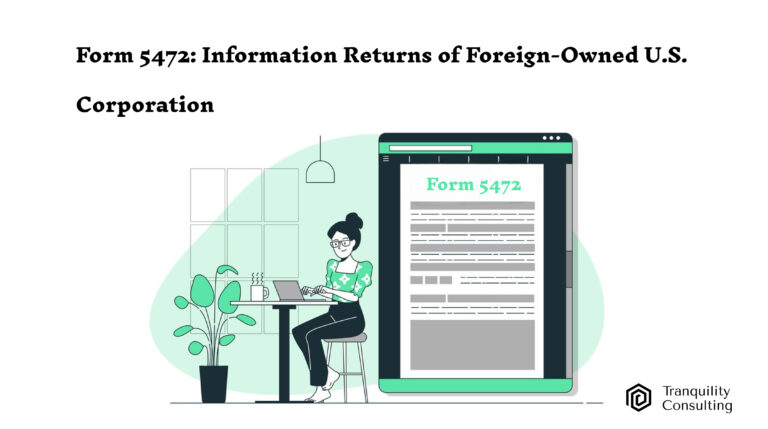In today’s global economy, foreign-owned companies, including those operating in the United States, play a significant role in shaping the economic landscape. However, foreign-owned does not exempt businesses from adhering to the information reporting requirements the Internal Revenue Service (IRS) set forth. These regulations ensure that foreign entities conducting business in the U.S. comply with the same tax and information-sharing standards as domestic companies. This blog delves into Form 5472-the information return required of foreign-owned U.S. corporations—covering what it is, when it applies, regulations, and the penalties for non-compliance.
What is Information Reporting for Foreign-Owned Companies?
Information reporting for foreign-owned companies refers to the mandatory disclosure of a U.S. company’s business transactions and financial data when owned by foreign entities or individuals. This ensures that the U.S. government can maintain transparency regarding the business activities of foreign entities in the U.S. market and assess their tax liabilities. The critical form in this process is Form 5472, which must be filed alongside Form 1120 by foreign-owned U.S. companies. These forms provide the IRS with data on companies that may have international tax obligations, helping to ensure that all income generated in the U.S. is appropriately taxed.
Essential components of information Returns consist of :
- Form 5472: Collects detailed information on reportable transactions between the U.S. company and its foreign owners or related parties.
- Form 1120: The U.S. Corporation Income Tax Return must be filed by the company, even if no income is generated or no tax is owed.
- Financial transparency: Information reporting ensures foreign shareholders cannot evade U.S. tax laws by concealing income or using complex international structures.
- Annual requirement: Foreign-owned U.S. companies must submit these forms annually to meet their tax responsibilities, with the IRS carefully scrutinizing the reports for compliance.
When is Information Reporting Applicable?
Information reporting for foreign-owned companies applies under specific conditions that dictate when a U.S. company must file Form 5472. The IRS has established certain thresholds for determining a company’s reporting obligations, ensuring that only relevant businesses comply.
Criteria for applicability include:
- 25% Foreign Ownership: If a foreign person or entity owns at least 25% of the company’s stock
Or equity, Form 5472 becomes mandatory. - Reportable Transactions: If the U.S. company engages in reportable transactions with its foreign
The owner or any other foreign-related party must file Form 5472. These reportable transactions
Include:- Sales and purchases of goods or services
- Payments of rent, royalties, or interest
- Loans or advances
- Transfers of tangible or intangible property
- Single-Member LLCs: If a foreign person owns a U.S. single-member LLC, which is treated as a
Disregarded entity for tax purposes, the LLC must file Form 5472. - No Income Threshold: These reporting requirements do not have an income threshold. Even if the company does not generate income, the reporting obligation applies if the ownership or Transactional conditions are met.
Filing Deadlines:
If the organization meets the filing requirements, Form 5472 must be submitted alongside the reporting corporation’s annual income tax return (Form 1120) by its due date. Generally, the deadline for Form 1120 is the 15th day of the fourth month following the end of the business’s tax year. More details on tax return deadlines can be found on the IRS website.
Regulation Information Required Under Sections 6038A and 6038C
When reportable transactions occur with a foreign or domestic related party, additional regulations come into play under Sections 6038A and Section 6038C of the Internal Revenue Code. These sections impose specific reporting requirements to enhance the IRS’s ability to monitor and analyze the transactions between U.S. entities and their foreign affiliates.
- Section 6038A mandates that U.S. corporations with foreign ownership file additional forms if they engage in specified transactions with foreign affiliates. This includes reporting information on the nature of the transactions, the identity of the parties involved, and the financial implications of such dealings. The aim is to ensure that the IRS is informed about transactions that may have tax implications, helping to prevent tax avoidance by manipulating transfer pricing or other means.
- Section 6038C addresses explicitly the failure to provide the required information under section 6038A, resulting in potential penalties. This section emphasizes the importance of accurate reporting and the consequences of non-compliance, ensuring that companies remain vigilant in their reporting obligations.
Compliance with these regulations is critical for foreign-owned companies, as failure to adhere can lead to significant penalties, which can compound if transactions are not reported accurately or in a timely manner. Therefore, businesses must maintain meticulous records of their reportable transactions and related party dealings to fulfill these requirements effectively.
What Are the Penalties for Non-Compliance?
Failing to comply with the information reporting requirements for foreign-owned companies in the U.S. can lead to significant penalties. The IRS enforces these regulations strictly, and the financial consequences. Non-compliance can escalate quickly. Businesses unaware of their obligations are not exempt from these penalties.
Penalties for non-compliance include:
- Failure to File: A company that fails to file Form 5472 or Form 1120 faces a penalty of $25,000
Per form, per year. If the company continues to be non-compliant after the IRS issues a notice, an
An additional $25,000 penalty may apply. - Inaccurate Information: Providing incorrect or incomplete information can also result in
Penalties. A $25,000 fine applies if the IRS determines the submitted information is insufficient.
Or inaccurate. - Cumulative Penalties: Penalties can add up quickly. For example, failing to file both Form 5472
And Form 1120 could result in penalties totaling $50,000 for that tax year. - IRS Audits: Continuous non-compliance or repeated inaccuracies can trigger an IRS audit, leading
To additional penalties, interest on unpaid amounts, and, in extreme cases, legal consequences. - Extension of Statute of Limitations: Failing to file Form 5472 can also extend the statute of
limitations on the company’s entire tax return, leaving the company exposed to IRS scrutiny for a
More extended period.
Conclusion
Information reporting for foreign-owned companies is essential to operating in the U.S. for foreign-owned businesses. The IRS requires these companies to file specific forms, most notably Form 5472 and Form 1120, to ensure financial transparency and compliance with U.S. tax laws. Failing to comply with these requirements can result in hefty penalties, so it is critical to understand when the reporting obligations apply, the consequences of non-compliance, and how to file the necessary forms accurately. By staying informed about the information reporting requirements for foreign-owned businesses and seeking professional guidance, companies can avoid penalties, maintain compliance, and operate smoothly within the U.S. tax system. Always consult a tax professional if you need clarification about your obligations or the filing process, as non-compliance costs can be steep.
FAQs
1. Who needs to file Form 5472?
Foreign-owned U.S. companies with at least 25% foreign ownership or reportable transactions with foreign parties must file Form 5472.
2. What are reportable transactions?
Reportable transactions include sales, purchases, loans, payments of rent or interest, and property transfers between the U.S. company and foreign-related parties.
3. What is the penalty for not filing Form 5472?
The penalty is $25,000 per form per year. Additional penalties apply for continued non-compliance.
4. Can Form 5472 be filed on paper?
No, Form 5472 must be filed electronically along with Form 1120.
5. How can companies avoid penalties?
Ensure timely filing, maintain accurate records, and seek help from a tax professional to avoid penalties.
If you have any questions or need business-related tax consulting advice, please get in touch with us at: [email protected]





